
|
|||
|
CLINICAL STUDIES / ETUDES CLINIQUES
AUDITING THE ATTITUDE AND KNOWLEDGE OF PARENTS OF CHILDREN WITH FEBRILE SEIZURES
EXAMEN DE L'ATTITUDE ET DES CONNAISSANCES DES PARENTS D'ENFANTS PRESENTANT DES CONVULSIONS FEBRILES
E-Mail Contact - ZEGLAM Adel M. :
zeglama@yahoo.com
ABSTRACT Introduction Aims Method Results Conclusion Key words: febrile seizures, Tripoli, Libya, knowledge, attitude, Al-Khadra hospital. INTRODUCTION Febrile seizures (FS) are generally considered to be benign, occurring in 2-5% of all children (1). FS are the most common seizures disorder in childhood occurring between 6 months to 6 years, with a peak incidence at 18 months in industrialized countries (1) (11) (15). Very little is known about the incidence of febrile seizures in Libya. A hospital based study was conducted at Al-Khadra hospital, Tripoli Libya in 2004 revealed a rate of 7.5% (17). Most parents faced for the first time with a febrile seizure in their child, may believe that the child is dying (3). Febrile seizures provoke an anxiety in most of the parents and relatives. High level of anxiety is more often found in parents with little or no knowledge on febrile seizures and with a low level of education (4). Adequate provision of information seemed to reduce this anxiety (2, 16). METHODOLOGY The parents of all children in the study period (2007 & 2008) admitted to Paediatric ward Al-Khadra hospital Tripoli, Libya with diagnostic code for febrile seizures were interviewed with the aim of evaluating the knowledge, attitude and practice of mothers regarding febrile seizures. A well prepared questionnaire was completed by parents of each child admitted with diagnostic code for febrile seizures. Total number of children admitted to the Pediatric ward in 2007 was 1506 of which 126 were diagnosed as Febrile Seizures (7.9%), and were selected randomly. Total number of children admitted to the Pediatric ward in 2008 was 1849 of which 113 were diagnosed as Febrile Seizures (6.1%), and were selected randomly. An organized and comparative prospective study was done to obtain the results before and after the introduction of the information leaflet. Libya is the fourth largest country in Africa. It lies on the north coast of Africa, on the Mediterranean Sea, and it is bounded by Tunisia, Algeria, Egypt, Sudan, Chad and Niger. Tripoli is the Capital of Libya. The adult literacy rate in 2003 was 91% and 81% for males and females respectively. The study took place in Al-Khadra hospital which is one of the main teaching hospitals housing a total of 640 beds. The Paediatric ward deals with emergency and routine admissions and secondary referral work from other hospitals and specialties. In 2008 the total number of children seen in the A/E department was 75000. The following exclusion criteria were used: child who has fever due CNS pathology, child who has history of neonatal seizures, child who has history of afebrile seizures, child who has previous history of neurological abnormality by examination or by developmental history, acutely ill child and any child whose age is less than 6 months or more than 6 years. The research aims and methods are explained to the parents involved in this study. A questionnaire was used to collect information from parents and includes questions related to knowledge, practice and attitude of mothers regarding febrile seizures. Sociodemographic data were also included in the questionnaire. Data analysis was performed using the SPSS 16 for Window statistical software package. Approval for the study was obtained from the Hospital Ethical committee. The purpose of the study was explained to all parents and written informed consent was also obtained. Sample Description Parents who witnessed the febrile seizure had rushed the child to the hospital as the first aid of management with a small percentage tried to cool the child or did both. (See Figure 1) Just a minority of parent in this study knew some information about seizures before their child had one. (See Figure 2) The 2007 study showed that the information given to the child’s parents was mainly verbally, while in 2008 (73%) of parents received written & verbal information together. (See Figure 3) About 70% of parents in the 2007 study indicated that they did not understand the information that was given to them or they understood it with difficulties while in 2008 about 78% of parents understood enough the information the information that was given to them. (See Figure 4) When reviewing the parents after the information given it was found that in the 2007 study most parent’s doubts were not at all cleared out (78%) while in the 2008 study just enough doubts were cleared & understood (77%). (See Figure 5) DISCUSSION AND CONCLUSION To the best of our knowledge, this current study is the first in Libya to evaluate and analyzes the knowledge, attitude and practice of mothers regarding FS. About 20% of mothers had heard or even observed seizures caused by fever. Most mothers did not know that epilepsy is different from FS. The attitude of mothers before and after the introduction of the information leaflet did not change significantly. Their practice, however, were still inappropriate. Most mothers did not know how to act toward a child with FS and would prefer to rush them to hospital (90% in 2007 and 86% in 2008).We found that the minority of mothers would take the child to accident and emergency department after giving prior first aid-a similar results was reported by other studies (12). About 70% of parents in the 2007 study indicated that they did not understand the information that was given to them or they understood it with difficulties while in 2008 about 78% of parents understood enough the information the information that was given to them. During data collection, some mothers were asked to demonstrate practically how to reduce fever, how to use a tepid sponging and how to measure temperature using thermometer. Most of these mothers were not able to do this adequately, nor were dosage of antipyretic drugs measured accurately. However, since we did not include questions relating to accuracy of dosage, or of the methodology of reducing fever in our questionnaire, we are unable to discuss or give accurate figures on this issue. It had been suggested that significant improvement were achieved by educating the parents regarding their knowledge, practice and attitude-specifically by providing advice on how to act toward a febrile child(5) (8) (13) (2) (14). RECOMMENDATIONS A well organized educational program should be conducted for parents of children with febrile seizures who were admitted to the hospital in order to decrease their anxiety and fear. All patients who are admitted to the hospital with febrile seizures should be given leaflets covering the following issues: brief idea about the pathophysiology of the disease risk of recurrence, course of the condition, first aid training, and when to bring child to the hospital for further assessment.
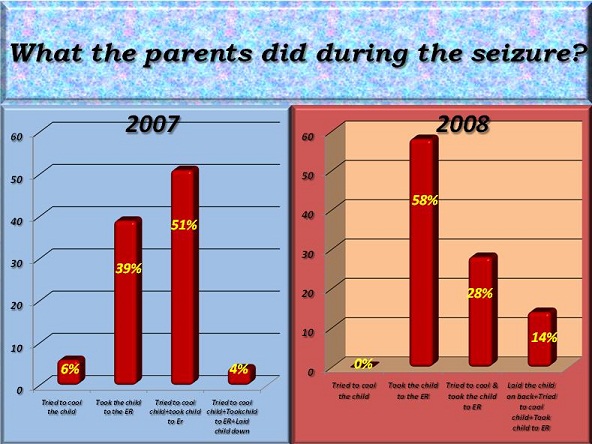 Figure 1 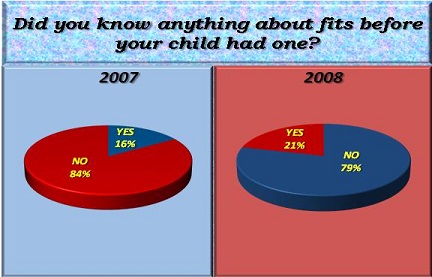 Figure 2 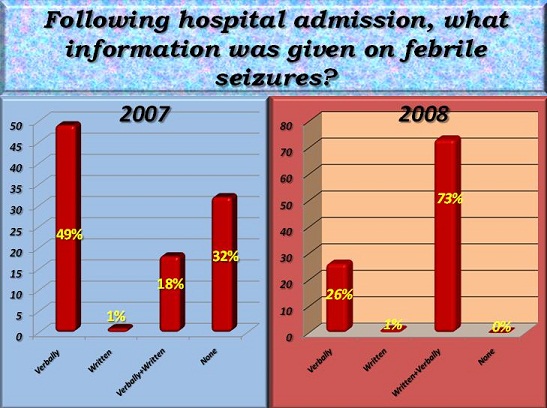 Figure 3 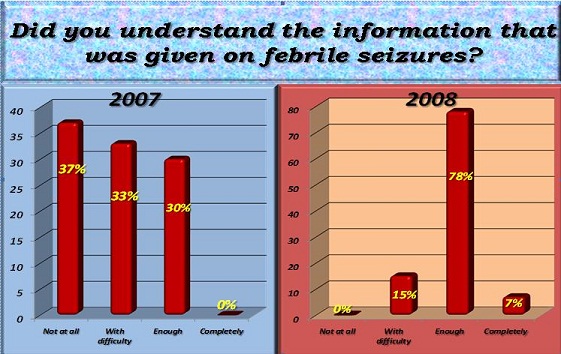 Figure 4 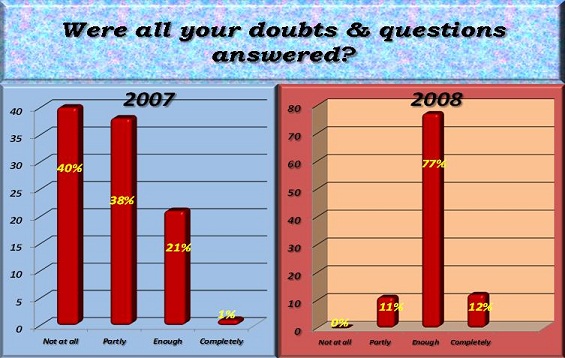 Figure 5 REFERENCES
|
© 2002-2018 African Journal of Neurological Sciences.
All rights reserved. Terms of use.
Tous droits réservés. Termes d'Utilisation.
ISSN: 1992-2647